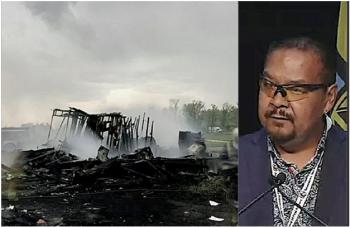Image Caption
Summary
Windspeaker.com Contributor
Personal tragedy provided significant weight to a regional chief’s report on housing and better emergency infrastructure for First Nations in Canada.
“Right now I’m a homeless regional chief in my own region. Me and my family,” said Kevin Hart of Manitoba.
Hart became emotional as he spoke to the delegates of the Assembly of First Nations annual general assembly. On June 9, the man who is co-holder for the portfolio on housing, water and emergency management, saw his family’s home on the Sagkeeng First Nation burn to the ground.
His words were choked as he said the Sakeeng fire crew was battling a wildfire 45 minutes away in Traverse Bay when an unrelated fire destroyed his home. By the time they made it back to Sagkeeng First Nation, his house was charred rubble.
Hart pointed out that his house was not supplied by the First Nation, but instead was a home his mother-in-law bought and transported to the First Nation 50 or 60 years ago. He said he used his own resources to work on renovations.
A handful of days after he lost his home, Hart was in Ottawa meeting with Indigenous Services Canada Minister Seamus O’Regan about the need for more housing and better emergency preparedness and services for First Nations. He said it was O’Regan who brought up the personal loss.
“I said, ‘I’m here to do a job on behalf of the First Nations … I have a job here to advocate on behalf of the 634 First Nations.’ And that’s what I did.”
“And my wife gave me that support and she said, ‘We’re no different than any other First Nation people out there right now. We’re homeless, we’re poverty stricken, we have nothing. And she told me, ‘You know what? We grew up like that on the reserve’.”
Hart said it was important that the children who were returning to the First Nations under the new federal Indigenous child welfare legislation not be homeless.
The AFN is working toward completing a National First Nations Housing and Related Infrastructure Strategy, which chiefs gave the go-ahead to in December 2018. That plan includes increased funding to adequately address both present and future needs, which include children in care returning to the reserve for, and for people impacted by Bill S-3, which provides gender equality.
A survey distributed to First Nations to gather information on housing needs had just over 63 per cent of the membership respond. The results have yet to be tallied but they will be used as the basis for talks with the federal government targeting adequate funding to address the “chronic shortage” of housing on reserve.
Hart also pointed out that “climate emergency” has impacted First Nations people through floods and wildfires. Eighty per cent of Indigenous communities are located in forests prone to wildfires. First Nations are 18 times more likely than their non-Indigenous counterparts to be evacuated because of floods and 30 times more likely to be evacuated because of fires.
He also highlighted the final report from the National Inquiry into Murdered and Missing Indigenous Women that mentioned the need for adequate housing 381 times.
“Lives are being at stake here. These are our loved ones,” said Hart. “The government fails us each and every day.”
Hart encouraged people on reserve to take photos and videos of their living conditions and show the government and the world “the realities” of First Nations, who are the rights holders to the lands and waters.
“My passion is never going to go away… and my resolve is not going to falter and I’ll continue to put this government to task,” said Hart.
“We have a long battle ahead of us, yes. There’s a lot of work, chiefs. But, you know, I’m willing to keep fighting for us because I have that passion and even more so now.”

